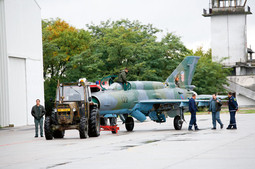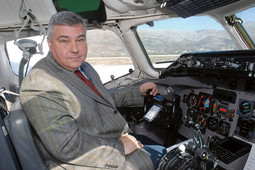Published in Nacional number 622, 2007-10-16
THE CROATIAN ARMED FORCES ON THE BRINK OF COLLAPSING
Defence Ministry facing brain drain
POOR WAGES, the lack of training possibilities, and unsettled housing solutions are the main reasons why experts are leaving the Defence Ministry
 NACIONAL’S article on the departure of pilots from the Armed Forces aroused a reaction from Minister Berislav Roncevic; one day after the article was published, he asked Croatia Airlines’ Management to employ the lowest possible number of pilots One day after Nacional published an article stating that 20 pilots were leaving the Armed Forces and would be hired in civil aviation companies, Defence Minister Berislav Roncevic spoke with the Executive Director of Croatia Airlines, Ivan Misetic, on 3 October and asked him to significantly reduce the number of pilots who would be employed by the national air carrier; Nacional’s source, closely connected to the Defence Ministry of the Republic of Croatia, uncovered that the aviation company is seeking a just under 15 pilots. According to the latest unofficial but reliable information, due to pressure from the Defence Minister, only 2-3 pilots will be employed instead of the ten carefully selected pilots who satisfied all criteria for employment in Croatia Airlines.
NACIONAL’S article on the departure of pilots from the Armed Forces aroused a reaction from Minister Berislav Roncevic; one day after the article was published, he asked Croatia Airlines’ Management to employ the lowest possible number of pilots One day after Nacional published an article stating that 20 pilots were leaving the Armed Forces and would be hired in civil aviation companies, Defence Minister Berislav Roncevic spoke with the Executive Director of Croatia Airlines, Ivan Misetic, on 3 October and asked him to significantly reduce the number of pilots who would be employed by the national air carrier; Nacional’s source, closely connected to the Defence Ministry of the Republic of Croatia, uncovered that the aviation company is seeking a just under 15 pilots. According to the latest unofficial but reliable information, due to pressure from the Defence Minister, only 2-3 pilots will be employed instead of the ten carefully selected pilots who satisfied all criteria for employment in Croatia Airlines.
In this sense, the Defence Minister has contradicted himself because he recently announced that the Defence Ministry will lose nothing if their pilots leave the Armed Forces; at the same time, he did everything to prevent pilots from continuing their careers in a desired environment where they would be motivated, whereby he created one more round of unhappy and unmotivated employees within the Armed Forces. With that, he did nothing good for Croatia Airlines either by constriction their selection of quality candidates.
However, Roncevic’s problems will not end soon because the Croatian charter aviation company Dubrovnik Airline also published a job advertisement for pilots; because Roncevic cannot influence companies which are not in state ownership, the exodus of pilots cannot be stopped in the amount which he expected. Based on the difficulty of education, the pilots are certainly one of the greatest intellectual and expert elites based on time and price, but not the only sector within the Armed Forces which are leaving the system disappointed.
Nacional has uncovered that over the past five years, 16 employees holding a PhD, 40 employees holding a Masters’ degree, and 960 university educated employees have left the Defence Ministry. An equal number will leave the Armed Forces as soon as they find employment somewhere else because earnings for their given profile of education and knowledge are, in general, at least 30% higher, as we learned from a highly positioned source at the Defence Ministry. Not only are the earnings higher; experts in commercial companies are offered possibilities for additional education and training, earlier opportunities to solve their living issues, as well as independence in creating and implementing ideas for tasks which they are involved in. It could be said that the Armed Forces became a destination for those who did not manage to return to normal civilian life after the completion of the Patriotic War, those whose companies were destroyed or filed for bankruptcy, as well as for individuals who are naturally prone to adventure tourism.
The Armed Forces are facing large and technologically demanding projects for modernization of the military, implementation of a new IT system, more intense knowledge of English, and departure to international military headquarters where other employees have two or more university degrees. It can be expected that because of these demands which are now appearing, key individuals and project leaders in the Defence Ministry and Armed Forces would be of exceptional quality, education and technological knowledge. However, the trend is the complete opposite: the few experts who remain in the Defence Ministry are overloaded and work under pressure on several projects; they leave as soon as they receive their first good chance for employment outside of the Armed Forces and no one new appears, because nothing is offered in the sense of quality for an expert. With that, within a year or two, one hundred of the top employees will go to the NATO headquarters in Brussels or other military commands throughout Europe, from Monza in Belgium to Naples in Italy. No one even wants to consider what will happen then.
 DEFENCE MINISTER Berislav Roncevic has done nothing during his mandate to stimulate scientists and experts to remain in the Armed Forces and Defence Ministry The main motivational problems for anyone who is considering entering the military are low wages, the impossibility of resolving housing issues, unpaid overtime for working hours and guard duty, as well as travel to work which can last up to two hours in one direction. Not only are the most educated staff leaving the Armed Forces, there is also discontent at the lower levels. Even the most elite professional formations such as the Special Operations Battalion and the 350th Intelligence Battalion have only two training session per year, thanks to American cooperation and the initiative to hold such meetings; due to a deficiency in quality substantial programs, the Anti-terrorist formations are sent to fight fires as was the recent case in the Kornati Islands.
DEFENCE MINISTER Berislav Roncevic has done nothing during his mandate to stimulate scientists and experts to remain in the Armed Forces and Defence Ministry The main motivational problems for anyone who is considering entering the military are low wages, the impossibility of resolving housing issues, unpaid overtime for working hours and guard duty, as well as travel to work which can last up to two hours in one direction. Not only are the most educated staff leaving the Armed Forces, there is also discontent at the lower levels. Even the most elite professional formations such as the Special Operations Battalion and the 350th Intelligence Battalion have only two training session per year, thanks to American cooperation and the initiative to hold such meetings; due to a deficiency in quality substantial programs, the Anti-terrorist formations are sent to fight fires as was the recent case in the Kornati Islands.
The expected peak for all professional formations, after all their training within the Armed Forces, is the waiting list for departure to Afghanistan where some confusion has already emerged because several soldiers are waiting for their second departure while their colleagues with the same knowledge and skills have been rejected for the second or third time. Soldiers are interested in going to Afghanistan entirely for their material interests because the wages of a non-commissioned officer in the military intelligence formations, along with child benefits, totals 4800 kuna, while the daily allowance alone totals €100 in the ISAF peacekeeping mission in Afghanistan. The second problem is the attributions to wages. It is absurd that military intelligence officers in the Military Intelligence Agency in Zagreb, who spend their time mainly in their offices in the Zagreb neighbourhood of Crnomerec and on Kresimir Square, have an attribution to their wages for difficult working environments totalling 1000 kuna, while members of the 350th Intelligence Battalion do not have that same right. In the past several years, there is a discernable trend that solders, non-commissioned offers and officers who are arranged in formations in Benkovac, Knin, Ogulin and Delnice seek the possibility to transfer to Zagreb.
Over 80% of all soldiers, non-commissioned officers and officers in the professional guard and other formations are separated up to 100 kilometres from their home base. Close to 10,000 solders daily, alongside school children, make up the greatest daily migrants who travel up to two hours to their jobs. They return home to their families around 6:00 pm.
It does not make much sense for them to remain in the base over the working week, because the conditions are far from normal, they are separated from their families, and there is no content which would fulfil the remainder of their days both in the military base and in the city. Apart from that, there is no motivation to remain on base due to the fact that they will lose the 500 kuna additional benefit to their wages for being separated from their families if they sleep in the base. Different to Croatian military bases, the bases for western armies are small towns or apartment communities with all additional entertainment where they live together and spend time with many families. They have large supermarkets, movie theatres, restaurants, sports facilities, daycares, pools, and numerous benefits for daily life. Croatia has possibly approached NATO in an organizational sense, but has done almost nothing for infrastructure or, most importantly, for the living standard of employees.
The relation of the Defence Ministry towards the living standards of its employees was seen in the NATO Noble Midas 07 military exercise. It could be said that the exercise, among other things, was held in Croatia in order to receive money for the expansion and adaptation of military facilities, which is clear proof that the Defence Ministry either doesn’t have money or does not want to change the current military infrastructure situation but rather wants to wait for charity from NATO because they have not invested anything in years, not even for personal equipment for soldiers in peacekeeping missions in Afghanistan. Luckily, the USA financially assists the Croatian Armed Forces in a military sense, so that since 2000, the Americans have assisted the Croatian Armed Forces with million USD either in money or equipment, which is not a negligible amount. The American military has invested 0,000 USD in the reconstruction and modernization of the Croatian military polygon “Eugen Kvaternik” near Slunj. The American program for military assistance brought the MILES 2000 simulation training system to Croatia, valued at .5 million USD and 156 transmitters for the needs of the Croatian formations valued at million USD.
 THE DIRECTOR of Dubrovnik Airline, Zeno Singer, will get a chance to employ more pilots in Dubrovnik due to pressure from Minister Roncevic on the director of Croatia Airlines, Ivan Misetic A negative atmosphere, the poor financial status of military staff, as well as the conditions which they work in year after year have influenced the decision of young recruits to start serving their military responsibilities. On the other hand, there are unmistakeable scandals, non-professionalism in the Armed Forces, harassment and degradation of recruits which has contributed to a dispersal of interest for serving the military service in the Armed Forces. Instead, the greatest numbers of recruits have signed up for civil service. The situation for military obligation was so poor that the decision was recently adopted to abolish mandatory military service and create a professional army. There is no motivation in the military service for anyone who wants to become a soldier. The Armed Forces, limited with its budget, did not manage to create a high quality, interesting program for training recruits. Invitations to military exercises are only remembered by the parents of the current recruits while they were in the Yugoslav National Army; now while serving military service, the soldiers shoot one round of ammunition, while everything else amounts to utility services and assistance in cleaning snow on football fields, maintaining guard duty in front of facilities which have no value, and experiencing a psychological drill from their superiors as to whether the bed is made properly or whether the bathroom is clean enough.
THE DIRECTOR of Dubrovnik Airline, Zeno Singer, will get a chance to employ more pilots in Dubrovnik due to pressure from Minister Roncevic on the director of Croatia Airlines, Ivan Misetic A negative atmosphere, the poor financial status of military staff, as well as the conditions which they work in year after year have influenced the decision of young recruits to start serving their military responsibilities. On the other hand, there are unmistakeable scandals, non-professionalism in the Armed Forces, harassment and degradation of recruits which has contributed to a dispersal of interest for serving the military service in the Armed Forces. Instead, the greatest numbers of recruits have signed up for civil service. The situation for military obligation was so poor that the decision was recently adopted to abolish mandatory military service and create a professional army. There is no motivation in the military service for anyone who wants to become a soldier. The Armed Forces, limited with its budget, did not manage to create a high quality, interesting program for training recruits. Invitations to military exercises are only remembered by the parents of the current recruits while they were in the Yugoslav National Army; now while serving military service, the soldiers shoot one round of ammunition, while everything else amounts to utility services and assistance in cleaning snow on football fields, maintaining guard duty in front of facilities which have no value, and experiencing a psychological drill from their superiors as to whether the bed is made properly or whether the bathroom is clean enough.
The annual needs of the Croatian Armed Forces total 16,000 recruits, but 40% fewer contingents have been coming to military training for years. The greatest number of those doing civil service instead of military service come from Pazin, Rijeka, Dubrovnik and Zagreb. Out of a total of 1129 young men who were supposed to serve in the military in 2005, 735 from Pazin decided to complete their responsibilities through civil service, totalling 65.99%. In Rijeka, that number totaled 67.62%, in Zagreb 56.22%, while Dubrovnik totalled 54.95%. Places where young men willingly attend military service are mainly in war affected areas: Sisak, Gospic, Vukovar, Slavonski Brod, Pozega, and Bjelovar.
In the explanation for the decision to abolish military service, it states that no one should be concerned with the fact that it is being abolished because there are 700,000 military reservists in Croatia. In that explanation, there is no statement that the aforementioned 700,000 military tributaries have not been invited to military exercises since 1995; they have never been introduced to new technological means, weapons, or any form of training. The greatest number of them had their last contact with the army 12 years ago when the Patriotic War ended; today they are significantly older with weaker psycho-physical capabilities which are required for today’s form of war.
It is clear that the decision to abolish military service was brought under pressure without further elaboration in order to replace such a large number of soldiers in the unclear exemplification of voluntary reserves. They are counting on 2000 highly motivated volunteers to fulfil the operating structure each year and they once again mention the already well-known story that the voluntary reservists will have an advantage in employment in public services, and that their arrival to the formations and to training and such will be paid. Similarly, when we deal with employment, the same was promised to Croatian veterans but nothing came out of that. Furthermore, military service has been abolished, but no one has still legally regulated the rights and responsibilities of voluntary reservists, so a vacuum has emerged which will need to be solved by some other government.
Related articles
Another 30 pilots to leave air force for civilian jobs
"The time has come for the combat component of the air force to be entirely shut down or for new aircraft to be procured. Anything else, including… Više
Latest news
-
28.10.2010. / 14:15
'A profitable INA is in everyone's interest'
-
28.10.2010. / 09:38
Sanader’s eight fear SDP — Won’t bring down Government
-
21.10.2010. / 15:02
Interior Ministry turned a blind eye on Pukanic assassination
-
20.10.2010. / 09:34
Barisic could bankrupt HDZ




